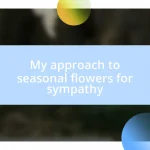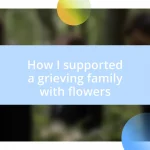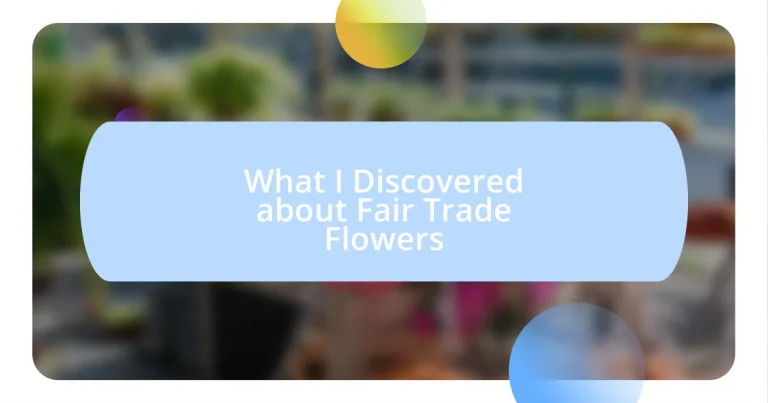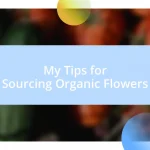Key takeaways:
- Fair trade flowers ensure ethical practices, fair wages, and safe working conditions for growers, positively impacting their communities.
- Choosing fair trade not only supports farmers but also often leads to fresher, higher-quality products, while promoting women’s empowerment in farming.
- Sustainable floral practices, including eco-friendly cultivation and community involvement, create a cycle of positivity and contribute to long-term environmental health.
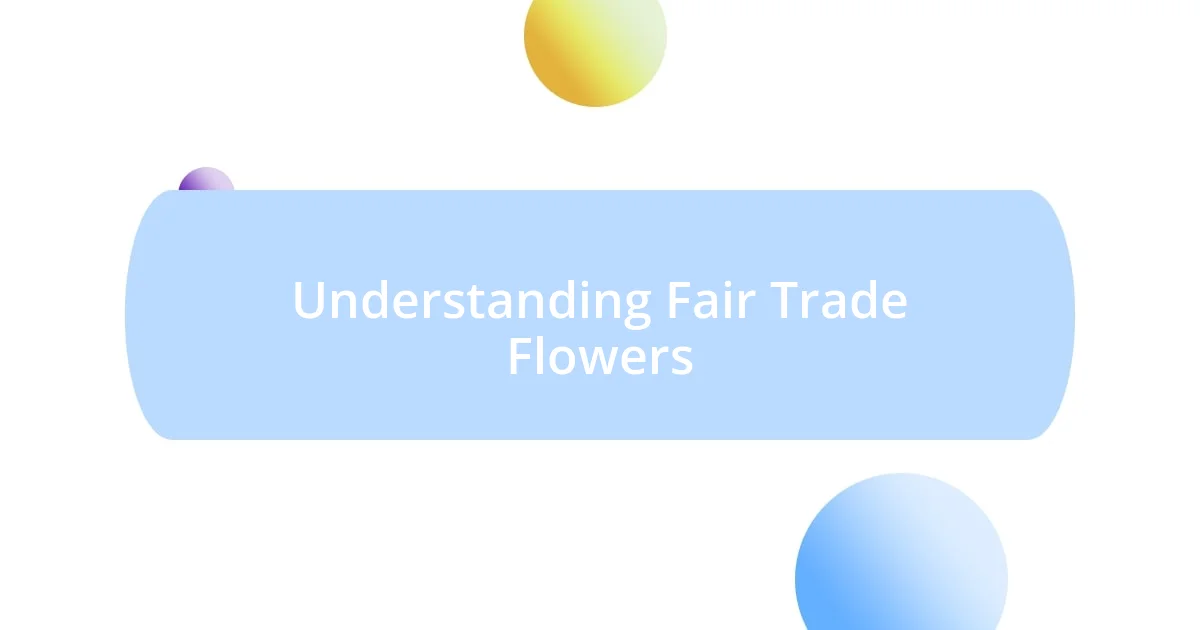
Understanding Fair Trade Flowers
Fair trade flowers are more than just aesthetically pleasing gifts; they symbolize a commitment to ethical practices in the floral industry. When I first learned about fair trade certification, I was surprised to discover how it ensures that flower growers receive fair wages and work in safe conditions. It made me think: how often do we consider the journey our flowers take before they arrive in our homes?
Understanding fair trade flowers also means appreciating the broader impact on communities. For instance, I once attended a fair trade fair, and hearing the stories of growers impacted me deeply. I realized that every bouquet I purchased could help transform lives, supporting families and providing education. Isn’t it amazing how such a simple choice can create ripples of positive change?
Moreover, fair trade practices extend beyond just financial compensation; they focus on sustainable farming methods that benefit the environment. I recall a time when I opted for fair trade flowers for a special occasion, and the vibrant colors were not only beautiful but a testament to organic growing practices. It made me wonder: if more people understood the benefits of these flowers, would we see a shift in consumer behavior toward sustainability?
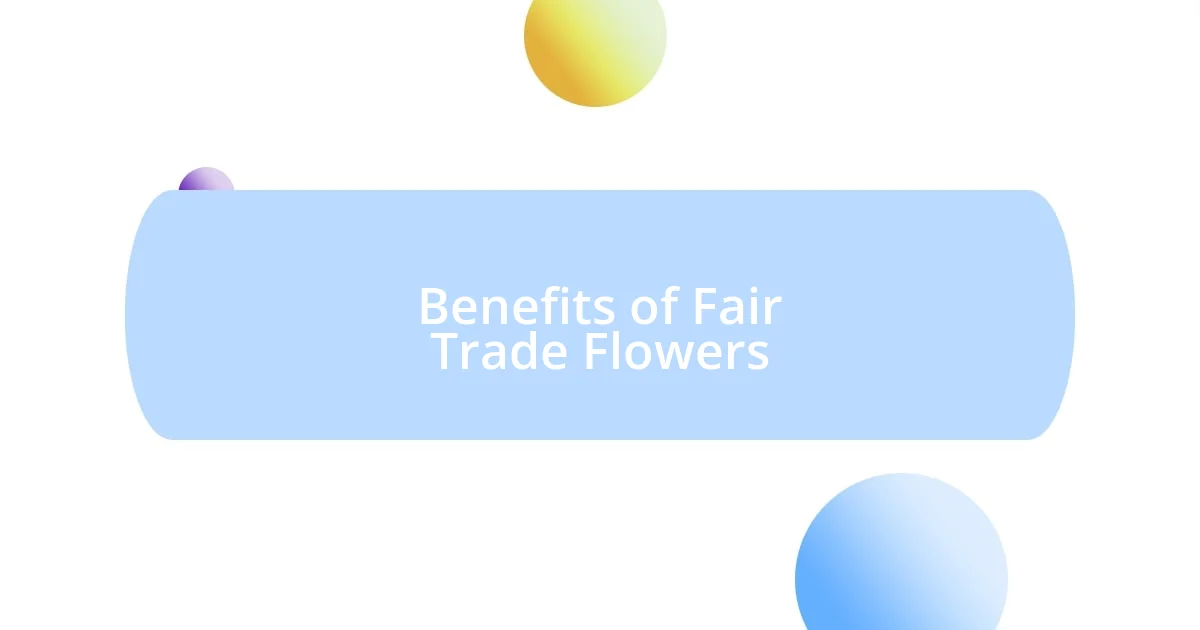
Benefits of Fair Trade Flowers
Fair trade flowers bring a wealth of benefits beyond their visual appeal. When I choose these blooms, I feel a sense of pride knowing that my purchase directly supports farmers who work tirelessly, often in challenging conditions. It’s heartwarming to realize that every stem I select not only beautifies my space but also contributes to the well-being of hardworking families.
In my experience, fair trade flowers often come with a freshness and vibrancy that’s hard to match. I remember buying a bouquet that lasted nearly two weeks, and it got me thinking: how often do we prioritize quality over cost? It’s a reminder that investing in fair trade doesn’t just mean supporting ethical practices – it often means experiencing superior products that enhance our lives more sustainably.
One of the most compelling aspects I’ve found is the impact on women’s empowerment within farming communities. At a recent fair trade event, I met a woman who runs a collective that creates job opportunities for local women. Hearing her story of resilience and hope made me realize how interconnected our world really is. By choosing fair trade flowers, I’m not just buying a beautiful arrangement; I’m participating in a movement that champions equality and sustainability.
| Aspect | Conventional Flowers |
|---|---|
| Fair Trade Flowers | Support for ethical practices |
| Farmer compensation | Often low wages |
| Environmental practices | Standard methods |
| Impact on communities | Minimal |
| Community empowerment | Limited opportunities |

How Fair Trade Works
Fair trade operates on a straightforward but impactful principle. Essentially, it connects consumers with producers who adhere to certain ethical standards. I remember a conversation with a local florist who specializes in fair trade arrangements. She described how the certification ensures that farmers receive a minimum price for their flowers, which protects them from market fluctuations and gives them financial stability. It struck me how this simple mechanism could profoundly affect the lives of so many families.
Here’s a closer look at how fair trade works:
– Certification: Flowers must meet specific social, economic, and environmental standards.
– Fair Price: Producers are guaranteed a minimum price for their flowers, ensuring fair wages.
– Sustainable Practices: Emphasis on environmentally friendly growing techniques.
– Community Development: Funds from sales are reinvested in community projects, like education and healthcare.
– Empowerment: Focuses on empowering small-scale farmers and particularly supporting women in the industry.
Sometimes I find myself marveling at how a shift towards fair trade can symbolize a broader movement for change. I recall purchasing a bouquet for a friend’s birthday and learning that a portion of the sale went into improving local schools in the growers’ community. That connection reminded me that choosing fair trade is more than a purchase; it’s an opportunity to be part of a movement that cares for humanity.

Selecting Fair Trade Florists
Selecting a fair trade florist can be a rewarding experience, but it does require some thought. When I first set out to find a florist committed to fair trade, I remember feeling a bit overwhelmed by the options. I suggest looking for florists who prominently display their fair trade certification, as it’s a sign of their commitment to ethical practices. Have you ever glanced at a store’s window and felt instantly drawn in by a simple logo? That’s what happened to me!
One time, I visited a local shop that hosted a small showcase of fair trade flowers and their stories. Listening to the florist share details about her partnerships with farmers made the connection incredibly tangible for me. I realized that selecting a fair trade florist isn’t just about buying flowers; it’s about joining a community that prioritizes social impact. So, don’t hesitate to ask questions! The more you engage, the more rewarding your experience will be.
Lastly, I’ve found that supporting florists who prioritize local sourcing of fair trade flowers often leads to a fresher product. I once gifted a bouquet that not only supported fair wages but also traveled fewer miles to reach my home. It was a beautiful reminder that each time we choose wisely, we’re contributing to something larger than ourselves. Wouldn’t you agree that such thoughtful decisions leave a lasting impression?
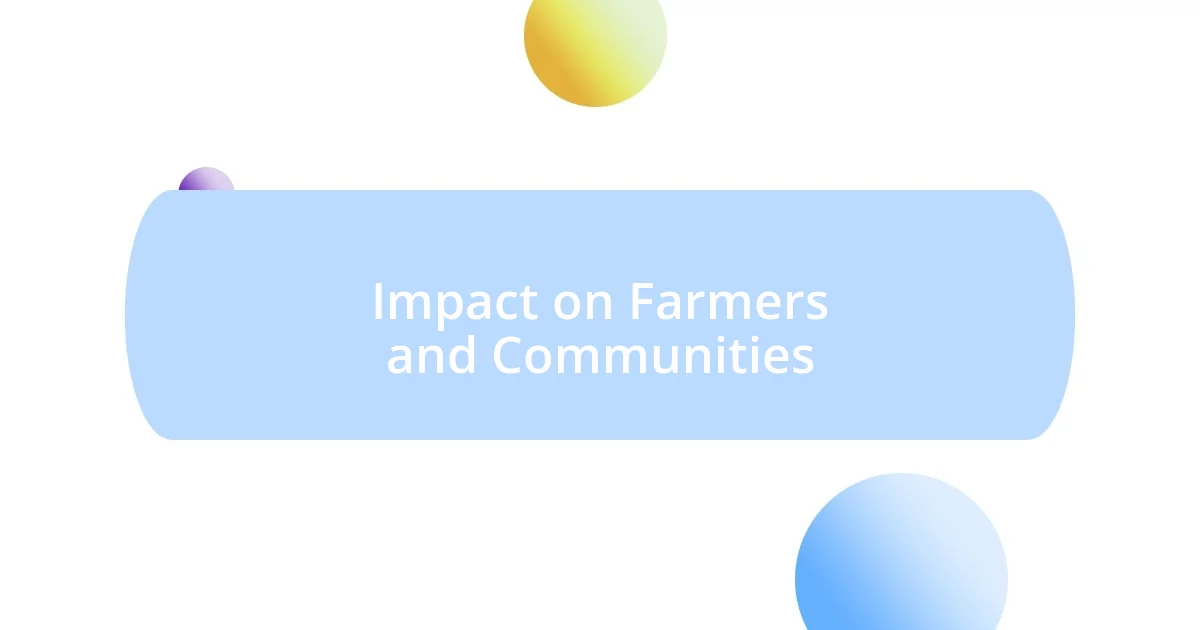
Impact on Farmers and Communities
One of the most heartwarming aspects of fair trade flowers is how they tangibly uplift farmers and their communities. I remember visiting a flower farm in Ecuador, where the growers spoke passionately about how fair trade has transformed their lives. The additional income enabled families to build homes, access better healthcare, and even send their children to school. Can you imagine the pride they must feel knowing their hard work directly contributes to their community’s well-being?
Beyond financial stability, fair trade fosters a sense of empowerment, particularly for women in farming. During my travels, I met several women who, through fair trade initiatives, were able to take on leadership roles within their cooperatives. Hearing their stories about starting small business ventures moved me; they weren’t just cultivating flowers but also nurturing dreams and aspirations. It made me think—what kind of ripple effect can one woman’s success have in her community?
In essence, fair trade flowers create a cycle of positivity, often tying back into local development projects. I recall reading about a community that used part of its fair trade profits to improve local infrastructure, like building roads and community centers. This investment not only strengthened their economy but also brought people together. Have you ever realized that your choice of flowers could help strengthen the bonds within a community? That realization has certainly made me more intentional about my purchases!
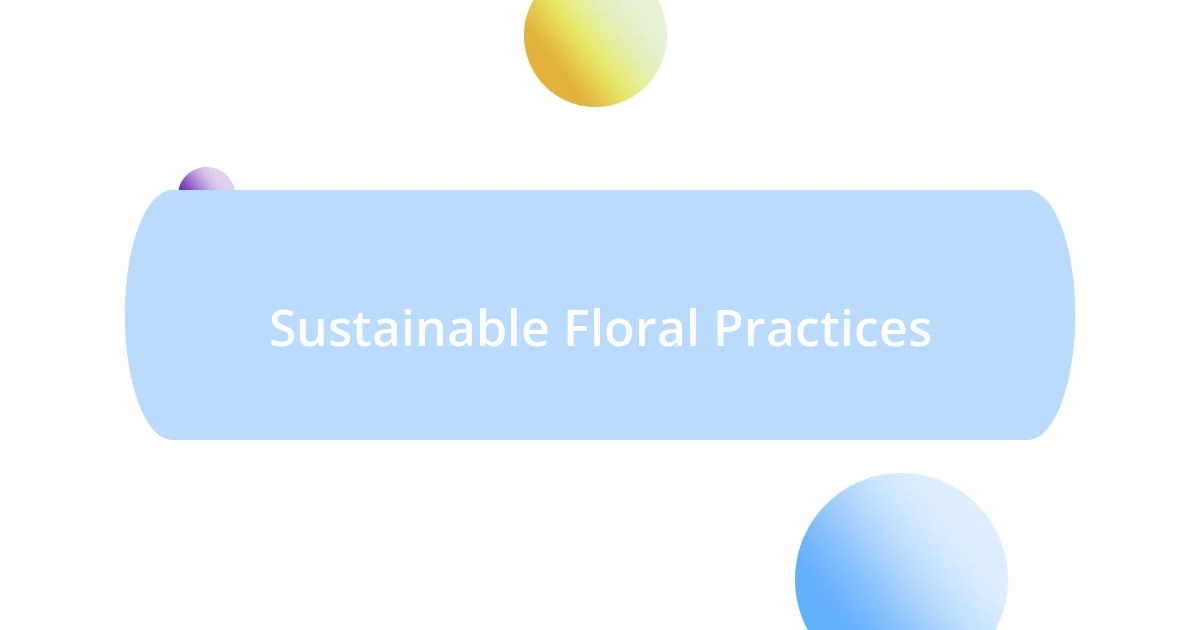
Sustainable Floral Practices
Sustainable floral practices extend beyond just the flowers themselves; they encompass the entire cultivation process. I remember visiting a farm that employed organic methods to grow its flowers. The air was fresh, filled with the scent of blooming roses, untouched by harmful pesticides. It struck me how these practices not only protected the environment but also resulted in healthier blooms, free of chemical residues. Isn’t it amazing how making eco-friendly choices can lead to such vibrant beauty?
Moreover, sustainable practices often include water conservation techniques, which I find particularly fascinating. At another farm, I saw their innovative rainwater collection system. They used it to irrigate the flowers, significantly reducing waste. This efficiency not only helps conserve a precious resource but also enhances the quality of the flowers. Wouldn’t you agree that sustainability shouldn’t simply be an afterthought but rather a standard practice for every florist?
I’ve also noticed that florists committed to sustainability often prioritize fair labor practices and community involvement. One such florist I visited hosted workshops for local youth, teaching them about floral design and the importance of sustainable agriculture. The excitement in the room was palpable, as young people grasped how they could contribute to their environment and economy. Engaging in these community-driven initiatives made me reflect: how can our choices inspire the next generation to appreciate and prioritize sustainability?





